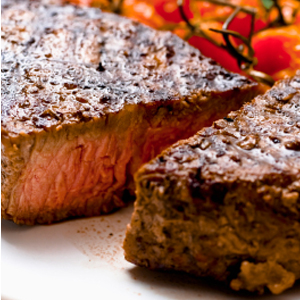
High-protein slimming diets, which also go under names such as the Atkins Diet, the Carbohydrate Counting Diet and the Drinking Man’s Diet, have been the subject of much controversy over the last couple of years.
These diets are all more or less based on the use of large quantities of protein foods of animal origin, such as meat, fish, eggs, cheese and milk products, and the exclusion of all carbohydrate foods.
Some of these diets permit the use of the so-called "free" vegetables and fruit, which contain only small quantities of carbohydrate (e.g lettuce, cucumber, grapefruit, strawberries etc).
The principle on which these diets work is as follows:
- The human body needs a source of energy and carbohydrates are the best source of energy available to us.
- If the body is deprived of its main source of energy, it has to burn up its available energy store of fat and you will lose weight.
Do high-protein slimming diets work?
Yes, these diets do lead to weight-loss. In fact, the weight loss can be quite substantial in some cases, but (and here lies the rub) it's lost at a terrible price, which can in some cases even kill the dieter.
What is the price?
This is what happens when you deprive your body of its carbohydrate energy source:
- In the absence of carbohydrate fuel, the human body is forced to burn body and dietary fat and protein to fulfil its energy needs.
- The breakdown products of burning large quantities of body fat for fuel are called ketones. These ketones will begin to accumulate in the body.
- A build-up of ketones can cause all kinds of damage to vital organs such as the liver and kidneys. The build-up deranges the body’s balance of acids and alkalines, causing a condition called acidosis.
- When the levels of ketones in the body reach dangerous proportions, the dieter finds him- or herself in the same kind of state as a diabetic who hasn't used any insulin. Unless immediate treatment is applied, he/she can slip into a coma, which may result in death.
The risk of death is well documented and regular reports are published in the medical literature describing deaths that result from the use of high-protein slimming diets.
Other nasty side effects
- Unpleasant body odour and bad breath. If you eat only protein foods, you start to smell like a carnivore. The bad smell is caused by the ketones that accumulate in the body.
- Increased risk of high blood-fat levels. High-protein foods are often also high in animal fats, particularly saturated fats and cholesterol, which raise blood-fat levels and increase the risk of heart disease and certain types of cancer.
- Loss of muscle tissue. You'll agree that this isn't the object of weight-reduction diets and it's ironic that the more carbohydrate you cut out of the diet and the more protein you eat to lose weight, the lower your body protein stores will be, because you're burning protein foods as fuel.
- Risk of deficiency diseases. Cutting out fruits and vegetables, which are our main source of antioxidant vitamins such as beta carotene, vitamin C, protective bioflavonoids, and certain minerals, to eliminate carbohydrate from the diet, exposes you to the risk of developing a whole range of deficiency diseases. Cutting out wholegrain cereals also exposes you to the risk of developing vitamin B and E deficiencies.
- Constipation. Carbohydrates such as fruit, vegetables, grains and cereals, particularly the wholegrain varieties, are the main source of dietary fibre in the diet. Eliminating these foods will inevitably cause severe constipation, which can lead to diverticulitis, irritable bowel syndrome, and may even make you more susceptible to bowel cancer.
Proof that these diets are bad for you
One of the most telling indications that high-protein slimming diets are not good for you is the fact that most of the diet books that advocate such diets, always warn that you should only use the diet for one, or a maximum of two weeks, at a time.
The writers know that these diets are fraught with negative effects, so they cover themselves against law suits by issuing these warnings. If you use these diets and suffer adverse effects, the blame rests with you for using the diet for too long.
What alternatives are there?
The best alternative to a high-protein slimming diet is to follow a balanced diet with a low fat, high fibre and high carbohydrate content, and to increase the amount of cardiovascular exercise you do.
Use plenty of wholegrain, unprocessed grains, high-bran cereals, fresh fruit and vegetables, lean meat and fish, low-fat or skimmed milk and dairy products, legumes and small quantities of polyunsaturated oil or margarine.
Make sure you don’t add fat to your diet by using cooking methods or salad dressings and sauces that have a low fat content - grill, poach and stew, and use low-fat salad dressings and low-fat yoghurt mixed with fresh herbs to add flavour to baked potatoes and salads.
And get active - walk, jog, cycle, join a good gym or start doing water aerobics.
The goals of a good slimming diet should be to reduce body fat, preserve lean muscle tissue and keep you healthy and fit. Any diets that are potentially risky should be avoided.
Dr I.V. van Heerden, DietDoc
Any questions? Ask DietDoc
Read more:
What to do if your low-carb diet is causing constipation
High protein diets may up your cancer and diabetes risk
We take a closer look at the Paleo diet and how it measures up




 Publications
Publications
 Partners
Partners









